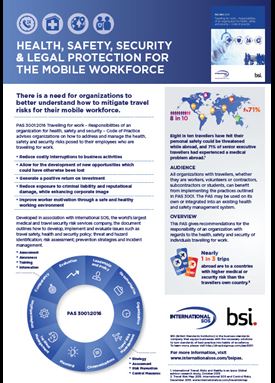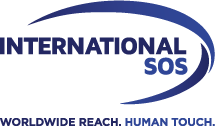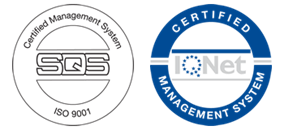New Code of Practice to Safeguard Travellers
London
New Code of Practice Helps Organisations Safeguard their Travellers

BSI, the business standards company, has published PAS 3001:2016 Travelling for work – Responsibilities of an organisation for health, safety and security – Code of practice. Developed in association with International SOS, the world’s largest medical and travel security risk services company, this new code of practice advises organisations on how to address and manage the health, safety and security risks posed to their employees who are travelling for work.
A recent Ipsos Global Advisor study found that 8 in 10 travellers have felt their personal safety could be threatened while abroad, and 71% of senior executive travellers had experienced a medical problem abroad.1
PAS 3001 offers organisations recommendations on how to develop, implement and evaluate issues such as travel safety, health and security policy; threat and hazard identification; risk assessment; prevention strategies and incident management.
Howard Kerr, Chief Executive at BSI said: “Global mobility has had a dramatic change on the way that we work today, affording both workers and organisations much greater flexibility but at the same time creating new risks. These risks must not go unchecked and, aside from everyday risks, there may be a significant difference between an assessed medical risk and an assessed security risk for a given location. These differences highlight the complexities organisations face when preparing workers for travel.”
An analysis of international business travel found that nearly 1 in 3 trips abroad are to countries with a higher medical or security risk rating than the travellers’ home country.2
PAS 3001 can be used by any organisation with travellers, whether they are workers, volunteers or contractors, subcontractors or students. The code of practice is also applicable to organisations that provide health, safety and security assistance to other organisations. The PAS may be used on its own or integrated into an existing health and safety management system.
Arnaud Vaissié, Chairman and CEO of International SOS, said: “We are in the business of helping organisations achieve their objectives while reducing risks to their people. Our goal in supporting PAS 3001 was to share our experience in travel risk mitigation and the lessons we’ve learned. While organisations have begun to consider response plans in the event of major catastrophes, we find the main risks to travellers are everyday incidents like petty crime, road accidents and falling ill. That’s why it’s so important that organisations don’t wait until the next crisis and have a support plan and network in place to safeguard their mobile workforce.”
Benefits of implementing PAS 3001 include:
- Reducing costly interruptions to business activities and allowing for the development of new opportunities which could have otherwise been lost
- Generating a positive return on investment
- Reducing exposure to criminal liability and reputational damage, while enhancing corporate image
- Improving worker motivation through the worker’s perception of a safe and healthy working environment
PAS 3001 was developed using a collaborative consensus-based approach with input from industry experts such as Association of British Certification Bodies, Association of Insurance and Risk Managers in Industry and Commerce, Control Risks, Falck Global Assistance, The Global Business Travel Association, Health and Safety Executive, The Institution of Occupational Safety and Health, Institute of Risk Management, International Organisation of Employers, International SOS Foundation, Mott MacDonald, Royal College of Physicians and Surgeons, SAP SE, The Security Institute, Trades Union Congress, University Health and Safety Association, and with expertise from Dr David Gold, Principal Consultant at Gold-Knecht Associates.
For more information, visit http://shop.bsigroup.com/pas3001. BSI and International SOS will host a webinar based on the PAS and best practices organisations can implement to manage risks on 20 October 2016 at 11:00 BST. The webinar is open to the public and you can register here.
About BSI
BSI (British Standards Institution) is the business standards company that equips businesses with the necessary solutions to turn standards of best practice into habits of excellence. Formed in 1901, BSI was the world’s first National Standards Body and a founding member of the International Organization for Standardization (ISO). Over a century later it continues to facilitate business improvement across the globe by helping its clients drive performance, manage risk and grow sustainably through the adoption of international management systems standards, many of which BSI originated. Renowned for its marks of excellence including the consumer recognized BSI Kitemark™, BSI’s influence spans multiple domains including Aerospace, Automotive, Built Environment, Food, Healthcare and IT. With 80,000 clients in 182 countries, BSI is an organization whose standards inspire excellence across the globe.
To learn more, please visit www.bsigroup.com.
About the International SOS Group of Companies
The International SOS Group of Companies is in the business of saving lives, protecting your global workforce from health and security threats. Wherever you are, we deliver customised health, security risk management and wellbeing solutions to fuel your growth and productivity. In the event of extreme weather, an epidemic or a security incident, we provide an immediate response providing peace of mind. Our innovative technology and medical and security expertise focus on prevention, offering real-time, actionable insights and on-the-ground quality delivery. We help protect your people, your organisation's reputation, as well as support your compliance reporting needs. By partnering with us, organisations can fulfil their Duty of Care responsibilities, while empowering business resilience, continuity and sustainability.
Founded in 1985, the International SOS Group, headquartered in London & Singapore, is trusted by 12,000 organisations, including the majority of the Fortune 500, as well as mid-size enterprises, governments, educational institutions and NGOs. 12,000 multicultural medical, security and logistics experts stand with you to provide support & assistance from over 1,000 locations in 90 countries, 24/7, 365 days.
To protect your workforce, we are at your fingertips: www.internationalsos.com
Notes to Editors
1.Travel Risk Map 2016. International SOS and Control Risks, December 2015.
International SOS TravelTracker data. International flights completed by 5,364,980 travellers between 1 October, 2014 – 30 September, 2015.
2. International Travel: Risks and Reality is an Ipsos Global advisor research study conducted among 10,726 people in 13 countries, including 2,391 senior executives. Research was conducted online using representative panels in the period September 25th to October 9th 2015. Data is weighted to be representative of the online population in each country using variables such as gender, age, education or region, depending on country. Penetrations of online access vary substantially between countries. The survey asks respondents about international travel preparation and medical and personal safety issues experienced abroad. Percentages in the report are based on either the proportion who travel abroad nowadays (7,633 people) or those who have previously travelled abroad (7,663 people).
3. According to Price Waterhouse and Cooper's 2010 Talent Mobility 2020 and beyond white paper, the number of people being assigned work abroad has increased by 25% over the past decade and a further 50% increase in growth is predicted by 2020. PwC Talent Mobility 2020









